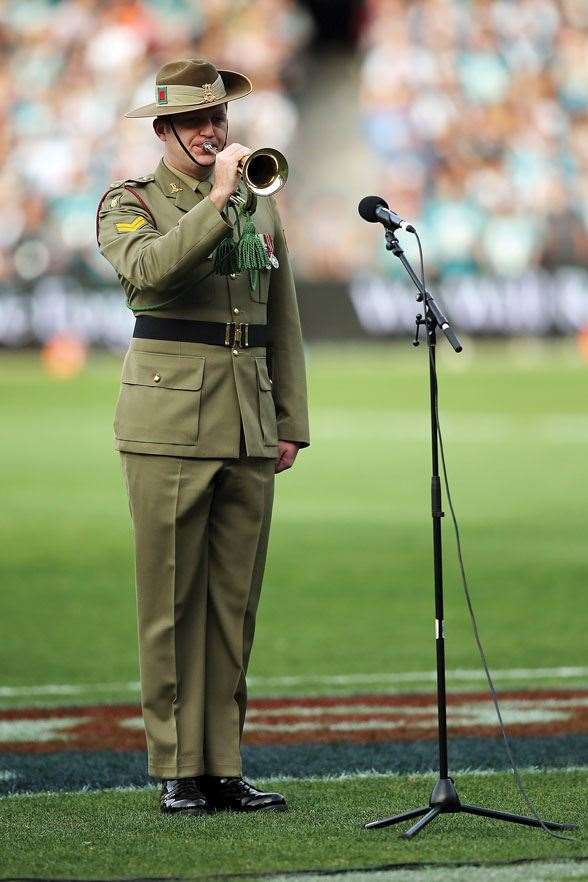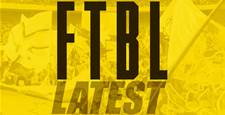Honest sentiment and corporate motives have never blended better.
The Anzac centenary this year should bring to our attention how much our football codes have turned Anzac Day into a brand. It’s a sadly unavoidable phenomenon, the conflating of sports and militarism. But what is intended as well-meaning remembrance, which seems natural at a big public gathering such as a footy match, has evolved into something else entirely, and it’s hard to unscramble honest sentiment from the corporate motives of the AFL, NRL and Super Rugby. As Robert Drane wrote in our pages a few years back: “The new homage anticipates war. The old homage denounced it ... That solemn minute of silence, or brief tribute on a sports show, have transmuted into entire shows, tribute games and awards.” Coincidentally, Anzac Day falls on a Saturday this year, which should make it seem like a normal sporting weekend. We’re guessing that won’t be the case, and our antenna will be buzzing for the first laboured metaphor from the commentary box comparing some act on the football field to one on the battlefield.
 The conflating of sports and militarism is, sadly, an unavoidable phenomenon. (Photo by Getty Images)
The conflating of sports and militarism is, sadly, an unavoidable phenomenon. (Photo by Getty Images)THIS MONTH'S OTHER WINNERS AND LOSERS ...
WINNER: SPORTS ON TV
The uncorking of new video entertainment streaming services at competitive prices into the televisions and devices of Australians is the greatest challenge facing broadcasters since the landing of pay-TV in the mid-1990s. The arrival of Netflix, plus Stan and Presto, with their vast libraries of on-demand content, upends the way viewers can (legally) get their fixes of movies and dramas. The concept of a TV “event” is so much harder to create now. Viewers want what they want when they want it – and will no longer be forced to wait around for some broadcaster to shoehorn them into a 7.30 slot on a Tuesday night … The threat to conventional TV ratings is enormous. Sport, on the other hand, is by definition “event” television. In this day of social media and mobile devices, it MUST be consumed LIVE as a shared experience. And all agree the way to keep people still watching free-to-air and pay-TV is through sport. So prepare for a seismic shift in the power balance between sport’s governing bodies and broadcasters. In this game, sports should be the winners … if they have their houses in order. Pay-TV providers are particularly threatened. There is talk of new pressures placed on the federal government and its Communications Minister to relax the anti-siphoning list of sports deemed to be of national interest and importance, thus preventing their broadcast from being “siphoned” off behind paywalls. This list was initially created for good reason, to thwart the likes of Rupert Murdoch and his interests from hijacking our national games and making us pay to see them. Yet for too long, free-to-air channels have treated viewers poorly in the way they have presented sports: interrupted by too-intrusive ads, time shifted when it suits them, and (still too often) in blurry standard definition. It is time for a re-evaluation of the way sport is consumed.
WINNER: PETER HOOLEY
One great thing about sports: when things happen that would be too sentimental for a Disney movie. But it’s hard not to be moved by the story of Peter Hooley, an Adelaide basketballer playing US college hoops for the University of Albany. With three other compatriots on the team, Hooley has turned the school in the New York state capital into an Aussie enclave, a mini-east coast version of St Mary’s. Hooley’s mother, Sue, was diagnosed with colon cancer four years ago. When her condition worsened earlier this year, Hooley left the team at midseason, and was with her when she passed in late January. Albany’s season had been teetering, but it won 18 of its last 19 games to make it to the championship final of their conference. On the final play, his team trailing 51-50, the ball was batted back out to Hooley at the top of the key with 1.6 seconds left. His last-ditch three-pointer found the bottom of the net, and sent Albany to the NCAA Tournament for the third time. Hooley became one of this year’s darlings of what is known as March Madness, eventually calling it what it truly is: “A storybook ending.”
WINNER: DAVID POCOCK
David Pocock, the Brumbies’ and Wallabies’ back-rower, has become known as that rare breed of socially conscious athlete, not content to limit his concerns to within the boundary lines of his sport. When Pocock called out a homophobic slur made by Jacques Potgieter during the Brumbies-Waratahs Super Rugby encounter, he made the strongest kind of statement for how sport should deal with such discriminatory acts. No just-part-of-the-game, or suggestions that it be dealt with at a later time – Pocock took it up with the referee right in the heat of the game, where it would have the most impact for the greatest number of viewers. If only other professional athletes had such commitment to the anti-discrimination policies that their sports supposedly espouse. Some have suggested that Pocock’s social views will hinder his chances at reclaiming the Wallaby captaincy – we say that his leadership qualities are there to see.
LOSER: NRL'S WAR CHEST
Rugby league officials are in a bit of a bind over the issue of player retention, but the idea of uncommitted stars being paid from an NRL war chest is destined to lead to headaches. We’re not making some kind of indignant, don’t-let-the-door-hit-em declaration – face it, Greg Inglis and his ilk do matter to our enjoyment of the game, despite all those protestations of the game being bigger than any single player. A properly administered sport should have a plan for keeping its best talents, and it’s a positive sign that the NRL actually has available funds these days to make a bid. But in a league so committed to equalisation, this practice of pay-to-stay will have incredible distorting effects, and create some terrible incentives (every top player, including the loyal ones, should drop hints about a code switch or European contract). Again, it’s a tough problem trying to contend with the global market for athletic talent (just ask soccer and basketball), but it should be the moment that the NRL looks at a larger overhaul of contracts, the salary cap and the career development of their players.
LOSER: MAJOR EVENT POLITICKING
At a launch event for the Major League Baseball in Sydney a couple years ago, we noticed that soon-to-become NSW Premier Mike Baird had a neat swing with the bat. Maybe he likes the big-event atmosphere a little too much, because in the annals of major event politicking, the idea of a Formula One Grand Prix in Sydney is one of the worst. It’s never promising, pardon the pun, when such notions emerge during an election campaign, but the idea of a F1 race across the Harbour Bridge was not only unserious, it was met with near-total disapproval – if you’re going to pick a major sporting event to spruik, don’t choose the one that also highlights infrastructure issues that voters are judging you on. And let’s face it: after the non-spectacle of the last Aussie GP, is an F1 race something anyone would want to steal right now?
LOSER: FIFA
So now we know. The 2022 FIFA World Cup will be held during the northern winter, with the final scheduled for December 18 of that year. Now we see the game played where FIFA (read president Sepp Blatter) massages this decision by shelling out hundreds of millions of the game’s dollars to broadcasters who have been hoodwinked into bidding for a tournament that was to be held six months earlier. Fox, in particular, had won broadcasting rights for the tournament in the lucrative American market. But with this new FIFA proposal, the tournament will clash directly with their vastly more lucrative NFL broadcasts. To keep them happy, FIFA recently accepted what is called an “uncontested” bid for the rights to the following 2026 tournament, for a price that was no doubt far lower than what they might have gained from an open bidding process that involved rival networks. It’s scandal upon scandal. Is Blatter worried? The 79-year-old comes up for re-election on May 29. He told a Swiss newspaper last month: “FIFA is more influential than any country in the world and every religion due to the positive emotions it releases.” He added: “We move masses. We want to use this to create more peace, justice and health in the world.” Right.
- By Inside Sport staff writers
Related Articles

19 Holes With ... Chad Townsend and Val Holmes

Viva Las Vegas: Join Golf Australia magazine's Matt Cleary on a golf and rugby league spectacular



.png&h=115&w=225&c=1&s=1)









